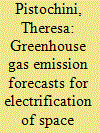| Srl | Item |
| 1 |
ID:
183594


|
|
|
|
|
| Summary/Abstract |
This study aims to inform policymakers about the greenhouse gas emission impacts of heat pump deployment in residential homes. Electric heat pumps eliminate direct burning of fossil fuels in homes but result in indirect emissions due to fossil fuels burned for electricity production. This paper presents the first detailed emission forecasts for operating either a heat pump or gas furnace for residential heating over a 15-year period, starting in year 2022 through 2036, in six regions across the US. The study accounted for long-run marginal emissions from electricity generation, emissions from natural gas combustion in homes, and fugitive methane and refrigerant emissions from leaks. The population weighted US average results show emission reductions for a heat pump over furnace to be 38–53% for carbon dioxide, 53–67% for 20-Year global warming potential (GWP), and 44–60% for 100-Year GWP, with reductions increasing over time. The impact of fugitive emissions from the furnace is significantly higher than that of the heat pump. While more energy efficient construction reduces overall emissions for both heating types, the forecasted percent emission reduction for replacement of a gas furnace with heat pump was not impacted by changes in home construction parameters.
|
|
|
|
|
|
|
|
|
|
|
|
|
|
|
|
| 2 |
ID:
128439


|
|
|
|
|
| Publication |
2014.
|
| Summary/Abstract |
China's carbon dioxide (CO2) emission ranks the highest in the world. CO2 emission from urban central heating, which has an average annual growth rate of 10.3%, is responsible for 4.4% of China's total CO2 emission. The current policy for improving urban central heating focuses on replacing coal with natural gas. This paper analyzes the existing situation and problems pertaining to urban heating, and evaluates the potential for reducing energy consumption and CO2 emission by heat pump heating. The results show that the current policy of replacing coal with natural gas for urban central heating decreases energy consumption and CO2 emission by 16.6% and 63.5%, respectively. On the other hand, replacing coal-based urban central heating with heat pump heating is capable of decreasing energy consumption and CO2 emission by 57.6% and 81.4%, respectively. Replacing both urban central and decentralized heating with heat pump heating can lead to 67.7% and 85.8% reduction in energy consumption and CO2 emission, respectively. The decreases in CO2 emission will account for 24.5% of China's target to reduce total CO2 emission by 2020.
|
|
|
|
|
|
|
|
|
|
|
|
|
|
|
|